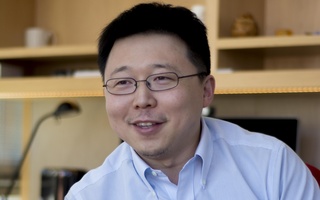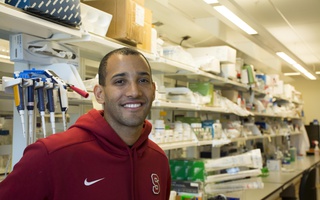A former Harvard post-doctoral researcher is suing a chemistry professor whose lab he worked in, alleging that the professor unfairly excluded him from a potentially lucrative cancer treatment patent.
Alexander Arefolov—who worked in the laboratory of Matthew D. Shair from 2011 to 2015 and filed the suit on May 4—claims he contributed to research on the compound cortistatin A. After the drug was licensed to Merck &Co. last year, though, Arefolov said his name did not appear on the list of inventors, cutting him out of monetary returns.
According to Arefolov’s complaint, Shair and others listed as inventors on the cortistatin A patents have received almost $6 million in patent royalties, and Harvard received an up-front payment of $20 million.
The post-doc was the only chemist other than Shair working in the lab when he started there, according to the complaint. The lawsuit further alleges that Shair repeatedly reassured Arefolov that he would be recognized on the patent.
“As an integral team member of the Cortistatin A Project for four years, Dr. Arefolov was involved in almost all aspects of the project,” the complaint reads. “Four years of lab notebooks, personal journals, email correspondence, and the testimony of the scientists working on the Cortistatin A Project will bear that out.”
The lawsuit also claims that the University failed to review the work of students and post-docs when determining inventorship—instead, the University allegedly relied on Shair to determine who would be given credit for the invention. Given that Harvard generally requires patent royalties to be shared equally between inventors, the complaint continues, omitting Arefolov from the inventors list could have increased Shair’s slice of the profits.
In a statement to the Boston Globe, University spokesperson David Cameron declined to comment on the lawsuit.
Arefolov’s attorney, Brian D. O’Reilly, previously represented Mark G. Charest, a former Harvard Ph.D. student who filed a similar suit in 2013. After roughly three years, Charest settled with Harvard in the summer of 2016.
—Staff writer Akshitha Ramachandran can be reached at akshitha.ramachandran@thecrimson.com. Follow her on Twitter @aramachandran13.
Read more in News
HMC Aims to Sell $2.5 Billion in Endowment AssetsRecommended Articles
-
Former Ph.D. Student Files Lawsuit Against University Seeking $10 Million for Royalties DisputeMark G. Charest, a former Harvard Ph.D. student, has filed a lawsuit against the University and chemistry and chemical biology professor Andrew G. Myers, seeking an estimated $10 million as compensation for alleged breach of contract and fraud, among other allegations.
-
Former Ph.D. Student Reaches Settlement with Harvard in Lawsuit over RoyaltiesIn the lawsuit, Charest alleged that Harvard coerced him into accepting a lower share of investor royalties from the patent of a pharmaceutical drug that he helped develop while working in the laboratory of Chemistry and Chemical Biology professor Andrew G. Myers.
-
 Patent Pending
Patent Pending -
 Late Nights, Chinese Takeout, and DNA Scissors: The Discovery of CRISPR
Late Nights, Chinese Takeout, and DNA Scissors: The Discovery of CRISPR -
 Late Nights, Chinese Takeout, and DNA Scissors: The Discovery of CRISPR
Late Nights, Chinese Takeout, and DNA Scissors: The Discovery of CRISPR













